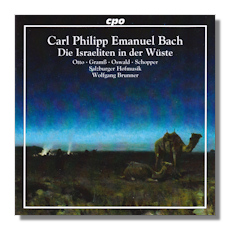
The Internet's Premier Classical Music Source
Related Links
- C.P.E. Bach Reviews
- Latest Reviews
- More Reviews
-
By Composer
-
Collections
DVD & Blu-ray
Books
Concert Reviews
Articles/Interviews
Software
Audio
Search Amazon
Recommended Links
Site News
 CD Review
CD Review
Carl Philipp Emanuel Bach

Die Israeliten in der Wüste, Wq. 238
- Gudrun Sidonie Otto (soprano), First Israelite
- Nele Gramß (soprano), Second Israelite
- Hermann Oswald (tenor), Aaron
- Michael Schopper (bass) Moses
Salzburger Hofmusik/Wolfgang Brunner
CPO 777560-2
C.P.E. Bach called Die Israeliten in der Wüste (The Israelites in the Desert) a "Geistliches Singgedicht" (sacred poem to be sung). This aptly describes the two elements of oratorio towards the end of the eighteenth century (the work was first performed in 1775, in Hamburg) and is reflected in the bipartite structure: the first part tells the story in a theatrical manner; the second reflects on the spiritual and theological significance of people on the edge of death and their determination and abilities to overcome enormous odds… "Our tongues stick to the roofs of our mouths", "The grave is all around us" and so on. Even within the community facing disaster there is tension – the despair of the Israelite women as opposed to Aaron, who only has words of encouragement. Moses plays a similar role – compassion for his people's plight and anger at their disobedience. This is a recording which amply – indeed, expertly – pulls out these nuances and emphasizes the dramatic as well as theological colors in Bach's work.
C.P.E. Bach wrote Die Israeliten in der Wüste in 1768/69 immediately after succeeding Telemann as music director at Hamburg. The subject matter offered scope for both operatic writing (approached with a subtle gusto by Brunner) and a somewhat neutral sacred style – just as was expected of him. Fittingly, the scale of the enterprise is respected in its forces on this recording: a small ensemble of instrumentalists and an equally modest chorus, from which the four soloists come. Once you stop expecting larger-scale spectacle, and concentrate on the interpretative aspects of the work, it gently reveals its many, somewhat subtle, strengths. Brunner's conception makes perfect sense, and is totally appropriate.
The soloists are by and large persuasive, though Nele Gramß's (soprano), Second Israelite falters at times – towards the end of the "O bringet uns…" aria [tr.7], for instance. It's important to catch every word; so you can. Michael Schopper's (bass) Moses is particularly convincing: clear, expressive and self-assured. The Salzburger Hofmusik under Wolfgang Brunner also play with an ease and sense of being on top of the delicate and intricate lines of melody which characterize C.P.E. Bach's at times almost romantic Empfindsamkeit, a quality that emerges most strikingly during some of the ensemble numbers such as "Umsonst sind unsere Zähren" [tr.13], where those emotions of despair and hope almost tumble after one another in short spaces of time. Similarly, C.P.E. Bach exploits the instrumental palette admirably… plangent and trembling strings, lamenting woodwind – with some lovely passages for bassoon; and percussion and continuo used extremely sparingly. Variety and purpose are watchwords to which these performers more than adequately live up.
The booklet is suitably informative and contains biographies of the performers as well as the texts in German and English. Since this is an unfamiliar work (its only current recording: William Christie recorded the work on Harmonia Mundi France in 1992), that is an advantage. The acoustic (that of the Solitär Mozarteum in Salzburg) is suitable for this work, although a little restrained and contained. This CD is a good example, albeit a relatively unambitious one, of how the German Enlightenment directed composers along galant paths in the years before Mozart. And these were substantial choral and vocal paths. If such a genre interests you, and/or you delight in managed passion and a barely detached treatment of a Biblical struggle from a C.P.E. Bach in his element, then you won't be disappointed by this careful and colorful recording on the ever-enterprising cpo.
Copyright © 2012, Mark Sealey.





















